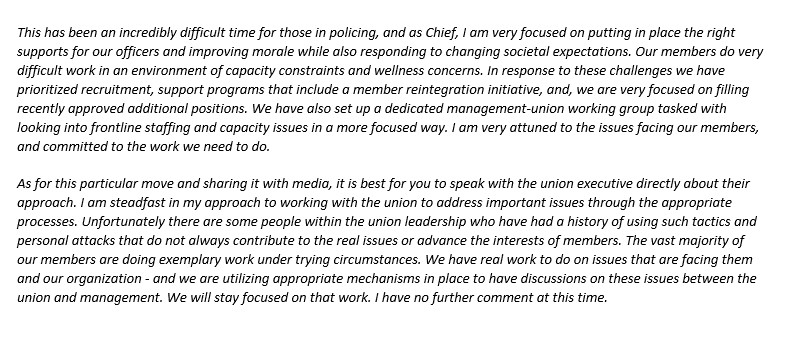The union representing members of Halifax Regional Police is having a vote of confidence in their police chief, and it’s been a while in the making. But, one policing expert says the vote doesn’t guarantee change.

Sgt. Dean Steinburg, president of the Halifax Regional Police Association (HRPA), told Global News this is an opportunity for members to express “their frustration with the current leadership.”
Steinburg said an accumulation of events from the past three years, since Chief Dan Kinsella was appointed, have led to the voting procedure.
“We don’t take this lightly,” he said. “This is unprecedented. We’ve never done this in the history of the police department.”
What led to the vote
The notice announcing the vote of confidence was sent out to members via email in the early afternoon of Oct. 14. In it, Steinburg said the union executive decided this vote is necessary.
The notice listed several issues leading to the vote, which included in part:
- lack of support for officers
- lack of resources to effectively police
- ineffective recruitment strategies and reduction in career opportunities
- “changing organizational priorities driven by social media”
There were also several specific incidents listed in the notice, including the leadership’s “failure to act in 2020 when it was clear a staffing crisis was looming.”
It also stated Kinsella does not have the support of Halifax Regional Council, as two of three proposed budgets were rejected, and that Kinsella has “returned” more than $3.5 million in his time as chief “despite shortages everywhere in the organization.”
A copy of the entire email notice is available here.
Most recently, Steinburg said members expressed disappointment with the lack of an operational plan and resources to respond to the large Dalhousie University homecoming party, which shut down a residential neighbourhood with thousands of youths participating.
The biggest issue has been and remains the staffing crisis, he said.
“That staffing crisis is creating a lot of extra stress and hardship on the members,” Steinburg said.
“We’ve been very, very patient and chief’s had three years to turn things around here … not enough was done.”
- What is a halal mortgage? How interest-free home financing works in Canada
- Capital gains changes are ‘really fair,’ Freeland says, as doctors cry foul
- Ontario doctors offer solutions to help address shortage of family physicians
- Budget 2024 failed to spark ‘political reboot’ for Liberals, polling suggests
Global News did not receive a response to a request to interview Kinsella. Instead, a spokesperson provided the same statement from Kinsella sent to CTV earlier this week, which read in part:
“I am very focused on putting in place the right supports for our officers and improving morale while also responding to changing societal expectations.
“We have prioritized recruitment, support programs that include a member reintegration initiative, and, we are very focused on filling recently approved additional positions. We have also set up a dedicated management-union working group tasked with looking into frontline staffing and capacity issues in a more focused way.”
As for sharing the vote of confidence note with the media, Kinsella said in the statement:
“Unfortunately there are some people within the union leadership who have had a history of using such tactics and personal attacks that do not always contribute to the real issues or advance the interests of members.”
View the complete statement below:
Steinburg said a vote of confidence was first brought up last fall, at a time when the union wasn’t prepared to go through with it. He said the union has tried “more traditional routes” in the past to spark that change, but they have been unsuccessful.
The vote of confidence is an anonymous process and will take place Oct. 14-30.
Steinburg said this hasn’t been an easy procedure for the union.
“No one wants to air their dirty laundry, obviously, if they don’t have to,” he said. “No one wants to come forward and say that things aren’t good in the organization that they work with or for, and that’s especially true in policing.”
Steinburg said a confidence vote in police departments is “extremely rare.”
“In my 32 years in policing, I can think of maybe three or four that have happened nationally, anywhere in the country.”
Vote ‘entirely performative’: policing expert
According to Steinburg, the goal is to inspire those who have the ability to create change, to do so. This includes the municipality and the Board of Police Commissioners, which oversees Halifax Regional Police operations and employs Chief Dan Kinsella.
“The fact that we had this vote should be quite alarming,” Steinburg added.
The Board of Police Commissioners declined a request for comment.
In an email, board chair Lindell Smith said: “I will be declining interviews on this matter, due to it being an employee/management issue. Once the survey results and vote is complete, there may be an opportunity for the commission to provide comment.”
In a separate email, the spokesperson for HRM Mayor Mike Savage also declined an interview, saying: “The Mayor is not commenting on the working relationship between the union and the Chief.”
Steinburg added that there was a strong mandate to take the vote of confidence, so he expects there to be “a significant portion that don’t have confidence” in the chief.
However, an expert in policing said the vote of confidence is “purely and entirely performative.”
Christian Leuprecht, a professor at the Royal Military College of Canada and Queen’s University, said even if HRPA members vote they have no confidence in Kinsella, the board does not have to act on the vote.
“It is a moral suasion with their own membership, with the board, with the chief, and in this case since they went public, with the public,” said Leuprecht.
“The board, as the governance mechanism, has to own those concerns and has to reassure the association and the public that the board is indeed meeting its mandate. But we also see many commissioners that simply don’t meet their mandate,” he said.
According to Leuprecht, it can be extremely difficult and expensive for a board to remove a police chief from the role. The vote of confidence, he said, could only be used as a part of an appeal to do so.
But, he said it’s an indicator of what’s going on in the HRP as an organization.
“I think it’s always a considerable breakdown within an organization when the association (HRPA) goes public with both its grievances and the intent to have a no confidence vote,” Leuprecht said.
“This does not bode well for the organization, and it does not bode well for the relationship between the chief, the (union), the police commission.”
Leuprecht said it’s an “interesting strategy” for the HRPA to make this list of issues with Kinsella public, adding it implies the association controls the narrative — accurate or not.
HRPA’s Dean Steinburg has told media it was not his intention to make this public before the email notice was leaked Monday.
Leuprecht said: “I am surprised and disappointed that the chief would not be giving an interview on the matter because, presumably, the chief would want to provide an explanation as to what is going on. And it’s also interesting that so far the police commission has been silent,” he said.
“Sometimes when commissions are silent, it means there’s a strategy behind that silence.”
He said though the association is the party that has spoken about this process, it does not mean the chief or the board are at fault here.
“It is not unusual for members in a (police) force to be profoundly aggrieved when it comes to their senior management, and especially when it comes to their chief. That speaks to a broader management leadership posture, culture, institutional culture, issues within policing in this country,” he said.
“What is impossible to ascertain, based on the information that’s currently available, is to what extent the association is politicking, and to what extent the association is putting forward longstanding, legitimate grievances.”
The reality is, he said, is that Kinsella will “probably” not be removed from his role in the case of a no-confidence vote.
But, making these grievances public may further aggravate the relationship between the chief and the union, he said.
Results of the no confidence vote will be presented at the Nov. 1 general meeting of the HRPA.







Comments